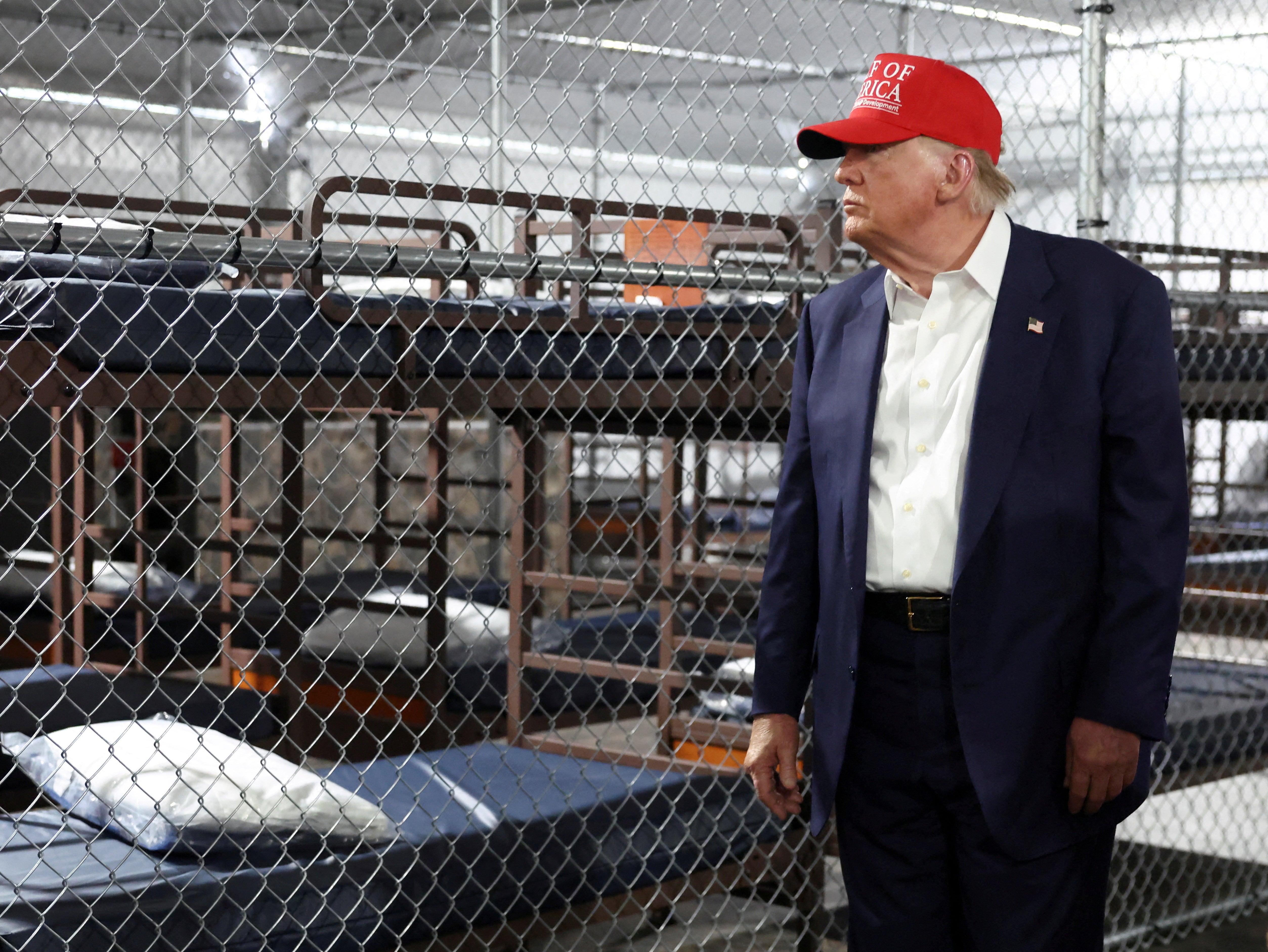Florida’s controversial 3,000-bed “Alligator Alcatraz” immigrant detention center could be shut down as soon as this fall after a wave of legal challenges.
But the state’s Republican Governor Ron DeSantis has a backup plan, and Donald Trump’s administration claims that a federal judge’s order to temporarily shut down parts of the facility — which could become permanent — will not halt the president’s aggressive anti-immigration agenda.
Immigrants are expected to be detained at other facilities in the state instead.
On Thursday, a federal judge ruled that no more detainees can be sent to the facility, which was built in a matter of days deep in the Everglades on an airstrip. The state can continue to detain immigrants who are currently imprisoned there until they are deported, according to the judge.
There was widespread outrage over the very notion of the facility when it was announced, with state and federal officials officially naming the detention camp after the notorious California prison, due to the threatening wildlife that surrounds it, which the Trump administration touted as a deterrent to people escaping.

Migrants are confined to cages with bunk beds, enduring Florida’s sweltering summer heat, pests and rationed meals. A separate federal lawsuit accuses the facility of blocking detainees from legal counsel and forcing people into “overcrowded, unsanitary, and harsh conditions” with inadequate food and “excessive use of force” from guards that sent at least one man to a hospital.
Members of Congress and state lawmakers who visited were stunned by the conditions they witnessed, and they demanded its immediate closure.
A preliminary injunction was issued this week in a federal lawsuit brought by environmental groups and the Miccosukee Tribe of Indians of Florida.
Judge Kathleen Williams’ ruling on Thursday follows serious concerns from the Miccosukee Tribe, a Native American community whose reservation lies within miles of the facility, about the development’s impact on their land and the environmentally sensitive Everglades.
“The project creates irreparable harm in the form of habitat loss and increased mortality to endangered species in the area,” Judge Williams said in the order. The further installation of any lighting, fencing, paving, tents, or buildings is forbidden, and “all generators, gas, sewage, and other waste and waste receptacles that were installed to support this project” must be removed in 60 days.

While the injunction is only temporary until a court can make a final decision in the case, the state and federal governments have appealed the decision and requested that the judge rule on enforcement while their appeal is pending, asking that she make a decision by Monday at 5 p.m.
Meanwhile, a third federal lawsuit against the facility — filed by immigrants’ rights advocates including the American Civil Liberties Union — challenges Florida’s authority to detain people there.
The suit targets the state’s use of what it describes as the “expansive and unlawful use” of the federal 287(g) program, which allows local and state law enforcement agencies to enforce federal immigration law.
Responding to Judge Williams’ decision, Governor DeSantis said on Friday that it was “not unexpected,” and the state would “respond accordingly.”
“We’re not going to be deterred,” DeSantis said. “We are totally in the right on this,” he added, referring to the president’s mass deportation program that Americans largely oppose.
Florida’s plan, it appears, is to double down on state-run detention centers and a second 2,000-capacity facility, dubbed “Deportation Depot,” at a shuttered state prison that closed in 2021 due to staff shortages.
That prison — located within a rural stretch of the state between Tallahassee and Jacksonville — will operate inside Baker Correctional Institution, joining a new wave of state-run detention centers as ICE looks to build capacity to detain more immigrants in similar facilities across the country.

“The reason for this is not to just house people indefinitely. We want to process, stage, and then return illegal aliens to their home country. That is the name of the game,” DeSantis said at a press conference announcing the detention center last week.
Speaking to NewsNation on Saturday, border czar Tom Homan said that “they’re not going to stop us doing what we’re doing.”
“We’ll follow the judge’s order, and we’ll litigate and we’ll appeal it,” he said. “But [the] bottom line is, we’re going to continue to arrest public safety threats and national security threats every day across this country.”
Homan said that ICE would simply adapt.
“If we have to send them to another facility. That’s what we’re going to do,” he said. “That’s why the president has asked for 100,000 beds in the Big, Beautiful Bill. So, we’re going to build 100,000 beds, so we’re not going to have a lack of bed space.”

The Independent reported earlier this month that ICE has inked nearly 800 federal 287(g) program agreements covering 40 states, funded by $45 billion in new funding to expand ICE capacity.
In Indiana, officials announced plans earlier this month to expand the Miami Correctional Centre, located 70 miles north of Indianapolis. Homeland Security Secretary Kristi Noem stated that the facility will have the capacity to detain approximately 1,000 immigrants. Officials have already dubbed this new detention centre the “Speedway Slammer”.
Separately, the Trump administration is reportedly in talks with Louisiana officials to detain immigrants at the infamous Angola prison. This facility, the largest maximum-security prison in the country, was built on a former plantation owned by a slaveholder. The Wall Street Journal reported that Angola, which currently holds around 4,300 people, mostly convicted of violent crimes, could house 450 immigrants as early as next month.



